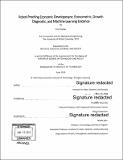Robot-proofing economic development: econometric, growth diagnostic, and machine learning evidence
Author(s)
Protzer, Eric(Eric Sean McMurtrie)
Download1117710054-MIT.pdf (10.51Mb)
Other Contributors
Massachusetts Institute of Technology. Institute for Data, Systems, and Society.
Technology and Policy Program.
Advisor
Elisabeth Reynolds.
Terms of use
Metadata
Show full item recordAbstract
Over the course of the 2 0 th century numerous economies have leveraged export-driven industrialization strategies to grow wealthier. The advent of automation technology, however, threatens to disrupt the low-cost manufacturing models which have characterized this process; the future may see factories resituated to high-income, high-skill countries which can successfully deploy automation. This thesis consequently evaluates how developing countries could navigate automation by either innovating abreast of it or specializing away from its impact. It is broadly divided into three sections. First, the stage is set by examining the political economy of industrial policy to highlight how political incentives constrain feasible strategies for economic readjustment of any sort. It is shown that even in a setting with few corruption problems - the European Union - industrial policy is guided by politicians' incentives to maintain power, and thus one ought to be cognizant of such incentives in any context. Second, possible barriers to greater productivity and innovation in developing countries are explored through a case study analysis of Vietnam, which is considered by some to be highly exposed to automation risk. Growth diagnostic tools are applied to identify the binding constraints which prevent it from shifting towards more complex, value-added economic activities. Structural economic reform is found to be critical to greater innovation, as opposed to technocentric solutions that aim to leapfrog to the technological frontier. Third, product space and machine learning methodology are used to simulate how countries' export diversification paths could respond to automation. By conducting sensitivity analysis across a range of automation scenarios it provides insight on how developing countries may be able to respecialize their economies to maintain growth.
Description
Thesis: S.M. in Technology and Policy, Massachusetts Institute of Technology, School of Engineering, Institute for Data, Systems, and Society, 2019 Cataloged from PDF version of thesis. Includes bibliographical references (pages 74-76).
Date issued
2019Department
Massachusetts Institute of Technology. Institute for Data, Systems, and Society; Massachusetts Institute of Technology. Engineering Systems Division; Technology and Policy ProgramPublisher
Massachusetts Institute of Technology
Keywords
Institute for Data, Systems, and Society., Technology and Policy Program.